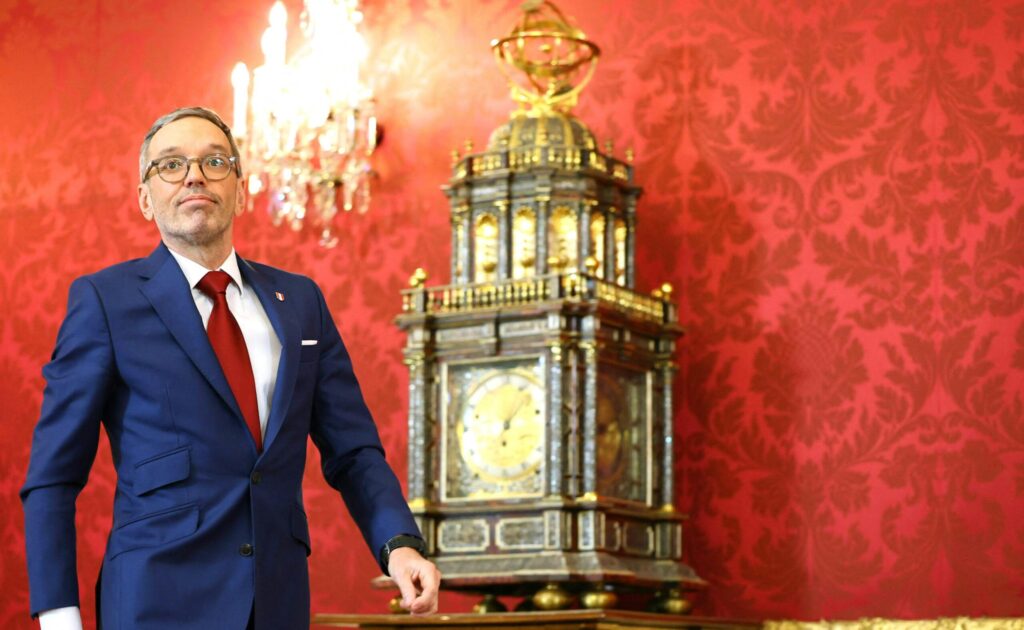Brussels – The black wave seems to be coming to a halt in Austria, at least temporarily. The leader of the ultra-right, Herbert Kickl, has put the mandate for the formation of an executive back into the hands of the president of the Republic after the failure of negotiations with the conservatives, who had already tried—unsuccessfully—to find an agreement with other parties in the Vienna parliament. Now, the ball is back in the court of the head of state, who may decide to convene new elections (at the risk of further strengthening the Euroskeptic radical right).
The failure of negotiations
No luck for Herbert Kickl, the head of the post-Nazi and pro-Russian far-right Austrian Freedom Party (FPÖ) that emerged victorious from the polls on 29 September in an unprecedented historic event. Talks with the conservatives of the People’s Party (ÖVP) have ended in failure, yet again.
Negotiations had been stalled for days, but the final break came early this afternoon (Feb. 12). In the letter putting back into the hands of the President of the Republic Alexander Van der Bellen the mandate for government formation, Kickl expressed “great regret” over the sideways step of the ÖVP, who, according to his version, would not be satisfied with the “concessions” made by the FPÖ on the distribution of the federal cabinet’s departments.

According to local media reconstructions, the Populars would not agree to leave the Interior, a key ministry for the management of the migration dossier (on which the FPÖ built its electoral fortune), to potential partners. Given the unwillingness of the other parties to govern with the far right, there was no alternative for Kickl but to throw in the towel.
The ÖVP’s vitriolic accusations
But his version was immediately contested by the Christian Democrats. The chairman of the Vienna provincial branch of the ÖVP, Karl Mahrer, placed the responsibility for the incident on the leader of the FPÖ. “The race for power and Kickl’s extreme demands have made it impossible to form a government,” he vented in a lengthy video message posted on X, claiming that “the Kickl system is failing on its own.”
Mahrer spared no personal attacks on the Radical Right leader: “Responsible government work is not possible with Herbert Kickl,” he said, as the latter would be “in a power frenzy” and would force his hand at the negotiating table.
Kickl’s rush for power and extreme demands have made it impossible to form a government – the Kickl system is failing on its own.
The government negotiations have failed – and for good reason. No responsible government work is possible with Herbert Kickl… pic.twitter.com/CDA2ZtdSQY
– Karl Mahrer (@KarlMahrer) February 12, 2025
In his view, the “red lines that must not be crossed” by any political force aspiring to govern Austria are “the clear commitment to the EU and our legal system, the protection of media freedom, the fight against anti-Semitism and trust in the international intelligence services.” These are principles that Kickl “demonstrated that he did not respect.”
Then the lunge: the leader of the FPÖ “does not want a government, he wants absolute power” and allegedly “tried to usurp European, constitutional and media agendas, as well as the security apparatus, thus endangering the democratic structures of our country.” “We gave Kickl a chance for political resocialization, but he did not take it,” Mahrer concluded, reiterating that his interlocutor “loves himself more than Austria” and has now become “a complete political failure.”
The post-election stalemate (and what happens now)
The previous attempt to create a three-way coalition between the ÖVP Christian Democrats, the Social Democratic Party (SPÖ) and the Neos liberals sank in early January. The stalemate in negotiations had led to the resignation of the then chancellor, the Popular Karl Nehammer, who had bet on the centrist alliance to exclude the FPÖ from the government area.
At that point, a window of opportunity had opened for the ultranationalist, anti-migrant formation to severe the cordon sanitaire that had relegated it to the margins of national politics since its inception (from the ashes of the SS) in 1956. It was an opportunity to translate the nearly 29 per cent support it gained from the popular vote and its 57 deputies to the Nationalrat (the lower house of the Austrian legislature) into real power, bringing Kickl to the chancellery.

So, on Jan. 6, the head of state tasked the leader of the FPÖ with starting new negotiations to set up an executive with the ÖVP. The two parties had been in government together before (in 2000 and 2017), but for the first time, the balance of power would be reversed. Above all, the Populars made it clear that they would not accept Kickl as Bundeskanzler because he was deemed too controversial and polarizing a figure.
Now, facing Van der Bellen are two alternatives to overcome a moment of political uncertainty unprecedented in duration in the recent history of the Central European country: retry the path of the centrist coalition or dissolve parliament and call citizens back to the polls. However, polls show that the only party to benefit would be the FPÖ itself, currently accredited with a virtual 34 per cent of support (not exactly what one would expect from a “political failure”).
All this while, as it is happening in Germany due to the flirtation between the CDU and the AFD, tens of thousands of citizens are manifesting in Austria, too, to protest against the normalization of the post-Nazi and pro-Russian ultra-right.
English version by the Translation Service of Withub






![Il commissario per l'Economia, Valdis Dombrovskis, in conferenza stampa a Strasburgo [12 febbraio 2025]](https://www.eunews.it/wp-content/uploads/2025/02/dombro-250212-120x86.png)
